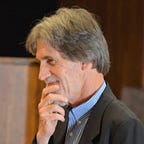The Strange Case of Manuel Rocha the US Ambassador Accused of Being a Cuban Spy
Did a U.S. Ambassador in Bolivia, allegedly working as a clandestine Cuban agent, cleverly intervene in the country’s presidential vote two decades ago to help lift the career of Evo Morales?
On Monday, U.S. federal prosecutors announced that they were charging the former U.S. Ambassador to Bolivia, Manuel Rocha, with serving as a clandestine operative on behalf of Cuba for four decades. This includes his time as ambassador in 2000 and 2002. According to the government’s criminal complaint Rocha secretly aided Cuba’s “clandestine intelligence-gathering mission against the United States” as he rose through the ranks of U.S. diplomacy.
I lived in Bolivia while Rocha was ambassador and reported on events there extensively in U.S. publications. There is a strange piece to this story that now deserves more attention than ever — Rocha’s over-the-top intervention in the country’s tumultuous presidential election in 2002. That was the election that turned Evo Morales from coca grower union leader into serious presidential contender, thanks a good deal to Ambassador Rocha.
It was a wild election, featuring a right wing former president seeking a comeback with the help of Bill Clinton’s top political consultants. Here is how I wrote about that intervention in one of my books about Bolivia, My Other Country (NFB Press, 2002):
Evo made his first run for President in 2002. In the beginning national polls left him a distant third behind the main event, a two-way race between the Gonzalo Sánchez de Lozada, seeking a Presidential comeback, and Manfred Reyes Villa, the charismatic mayor of Cochabamba.
Bolivia’s 2002 Presidential campaign also had another unexpected feature, it was documented from the inside in an extraordinary film, Our Brand is Crisis, by the U.S. filmmaker Rachel Boynton. The documentary captures the story of how two well-known U.S. political consultants from Bill Clinton’s campaigns, James Carville and Stan Greenberg, hired themselves out to help a deeply unpopular ex-President retake power in South America.
Goni’s election strategy (on full display in the film) was based on two essential findings from the Greenberg’s polling. First, about a quarter of the population supported him, and second, no one else but those people would ever vote for him. In a vote where anyone with the most votes wins, the campaign’s mission was a tricky effort to assure that no other candidate could crack the ceiling of 25% support. Reyes Villa had begun the campaign with polls showing his support at over forty percent. So the Goni strategy was all about bringing down Reyes Villa.
Four days before the vote, the U.S. Ambassador to Bolivia, Manuel Rocha, did a very peculiar thing. In an emotional public appearance reshown on every news station, he declared, “I want to remind the Bolivian electorate that if you choose the candidate who wants Bolivia to go back to being a cocaine exporter, that will put the United States aid at risk.” He left no mistake that he was referring directly to Morales and went on to compare the coca growers to the Taliban. It was a shockingly direct intervention into another nation’s Presidential vote in the final hours of the campaign.
The result was that, overnight, Evo’s support leapt in the polls, doubling in a matter of hours. To everyone’s surprise, including his own, he became an actual contender for first place. Morales joked that the ambassador was his best campaign manager. The other main effect was that Rocha’s outburst sent a tide of doubting Manfred voters to Evo in reaction to the ambassador’s declarations. On Election Day Sánchez de Lozada squeaked into first place and into the Presidency with 22.5% of the vote. Morales and Reyes Villa finished in a virtual tie for second place with 20.9% of the vote apiece.
It looked to me like a back door move to help Goni, the candidate clearly most favored by the Bush administration at the time. A decade later, Boynton’s documentary was remade with the same title by George Clooney as a Hollywood comedy starring Sandra Bullock and Billy Bob Thornton. One of my stranger experiences as a chronicler of Bolivia was when I sat one long morning in London with the scriptwriter, giving him ideas to make his invented Bolivia more authentic.
My small obsession with this conspiracy was one of the things I explained in detail to the script writer for the George Clooney version of these events. I found out the night that I saw the movie that my conspiracy theory had become a central plot point. In the film version U.S. embassy operatives with secret CIA connections pulled exactly the same denunciation maneuver against a candidate, paving the way for Bullock’s man to win.
In this case the fiction based on fact may be not nearly so movie-worthy as the actual facts. When I spoke to the film’s screenwriter I had no idea that Rocha, allegedly, would turn out to be Cuban agent at the time. Was that why he attacked Morales? Was it to throw off the scent of his Cuban entanglement? Was it a back door plan to boost Morales?
After the news broke yesterday an old friend of mine from Bolivia wrote me, “I bought all Rocha’s spy/intelligence related books from his wife Carla when they left. I asked about their plans and she said they were going to open a florist shop in Miami!”
It looks like Rocha might get to write a spy novel of his own.
